When reflecting on monumental moments from civil rights history in the state of Alabama, we are often reminded of notable events and figures from cities such as Selma, Birmingham and Montgomery. While these places are rich in historical knowledge, they often overshadow the contributions of other cities and organizations from that time. This is especially true in Huntsville, Alabama’s most populous city, which played a key role during the Civil Rights Era with regard to public school desegregation, economic development and justice, and advancements in spaceflight due in part to the desegregation of Huntsville.
The stories and figures from this time remain largely excluded from the canon of civil rights history, a challenge that iSchool Assistant Professor Dr. Beth Patin is solving through her work as executive director of Rocket City Civil Rights (RCCR), a nonprofit dedicated to archiving, advocating and assisting in social reform by uncovering and presenting Huntsville’s contribution to the civil rights movement. As a descendant of a family that altered the course of education equality in Alabama, Dr. Patin is leading RCCR’s efforts to preserve and present Huntsville’s civil rights history.
Making the Journey
In spring 2023, RCCR student collaborators from the iSchool joined Dr. Patin to conduct field research in civil rights archives and other local familial collections on the ground in Huntsville, all in an effort to digitize more than 1,500 archival documents.The group included three former students in the iSchool’s M.S. Library and Information Science program and recipients of the prestigious Wilhelm Library Leadership Award, namely:
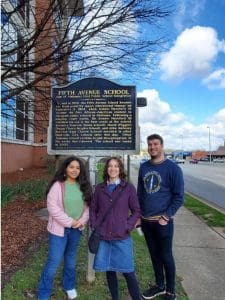
- Dr. Melissa Smith, G’23, an alumnus of The University of Texas at Austin (Ph.D.) and University of Rochester (B.A.). She has also been working with Dr. Sebastian Modrow on another project related to educational equity for Indigenous studies – a translation of the papal bulls that formed the Doctrine of Discovery.
- Kianna Shakir, ‘22 G’23, an alumnus of the B.A. English program in the College of Arts and Sciences and B.A. History program in the Maxwell School. Her undergraduate thesis focused on Black cowboys and reclaiming the western genre through narratives like Nat Love’s.
- Tyler Youngman ‘20 G’21, an alumnus of the iSchool’s B.S. Information Management and Technology program and the B.A. Music History and Cultures program. As a current student in the Ph.D. Information Science & Technology and CAS Women’s and Gender Studies programs, their ongoing research examines knowledge destruction and cultural erasure across information settings.
Rocket City Civil Rights
For the past several years, Dr. Patin and her team have been turning out new digital exhibits and interactive tools to connect people to Huntsville’s Civil Rights history. One of the first resources RCCR published was a series of oral history interviews conducted with the likes of Hank Thomas, a CORE member who trained Huntsville students and community members in the principles of nonviolent civil disobedience, and Leroy Daniels and John Nelson, whose work for Equal Employment Opportunity transformed Redstone Arsenal. These video interviews capture fascinating first-person accounts of the excitement but also the labor and even danger of the work for equal rights in Huntsville.
The most important of the published videos, however, is Dr. Sonnie Hereford III’s documentary, “A Civil Rights Journey” (1999), which tells the story of the work of Hereford and the Community Service Committee to desegregate Huntsville in the 1960s. Hereford himself shot much of the video used in this documentary on 8mm film, and through RCCR, it is now available for the first time online. The RCCR team has also used its collection of primary source materials –– including photos, scrapbooks, articles and documents from the Community Service Committee –– to generate a variety of digital resources to tell this important story. Visitors to the website can currently explore StoryMaps and an interactive timeline that allow them retrace the steps of Huntsville’s first library for Black citizens, virtually visit important sites in Huntsville’s civil rights movement, and view photographs and other primary documents from the time.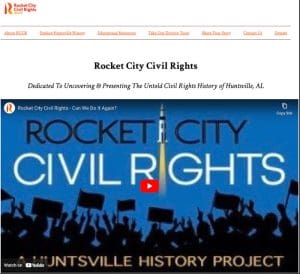
Exhibits like these are not possible without the key primary documents that provide evidence of this important past. The team in Syracuse had access to some digitized documents, but there were crucial gaps that needed to be filled to tell these stories. The collections themselves, housed in a private residence belonging to the Hereford family and in a storeroom at Calhoun Community College, needed documentation by information professionals. Digitizing is labor intensive and entails not just capturing images but also describing them and adding metadata so they can be retrieved and used appropriately. While the imaging was completed in Huntsville, the metadata work continues.
The team turned up some intriguing personal and civil rights-related items, including a book of poetry written by Dr. Sonnie Hereford III, Dr. Patin’s grandfather and a key figure in the civil rights efforts, and the original rubber stamps used by the Community Service Committee (organized by Hereford and others to fight for civil rights in Huntsville) to process their checks and business documents. Numerous receipts for donations and expenses, including one for Dr. Martin Luther King’s expenses when the CSC brought him to Huntsville to speak, told a story of daily effort and sacrifice by hundreds of people to make civil rights a reality in Huntsville.
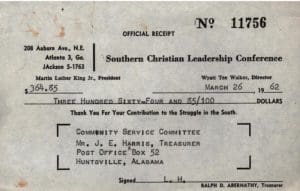
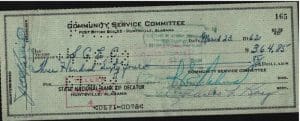
Pictured to the left is CSC’s receipt and canceled check from Dr. Martin Luther King and his organization the Southern Christian Leadership Conference in March 1964.
Beyond community impact, RCCR contributes to the ongoing body of academic research related to epistemicide, what Dr. Patin and colleagues in the Library and Information Investigative Team have described as the killing, silencing, annihilation of knowledge and ways of knowing. The nonprofit combats epistemicide by surfacing histories often excluded from the mainstream canon of civil rights history. Many of RCCR’s resources and initiatives are designed in an effort to promote Civil Rights Literacy, what Patin and Youngman describe as “a capacity to be culturally and historically knowledgeable about social movements.”
Exploring Huntsville History
During the research trip, the iSchool scholars were also given a behind-the-scenes tour of The U.S. Space and Rocket Center. Colloquially known as “Rocket City,” Huntsville became a core part of aviation history and the journey to get the U.S. to the moon. The Space and Rocket Center captures this important intertwined history of Huntsville and the Space Race. Not only were the iSchoolers given a tour of the public-facing parts of the institution, they were also shown the archives of the Space and Rocket Center. They were shown archival records on aerospace history and saw the depths of knowledge those archives hold, which included primary sources related to the Space Race and the papers about Operation Paperclip.
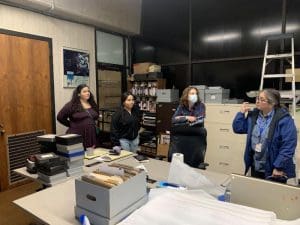
Huntsville Revisited is another example of how institutions led by members of a community and for their community are crucial places of information and reflection. The local history museum was founded in 2008 by William Hampton, born and raised in Huntsville, Ala. Most impressive is Hampton’s passionate narrative for each item within the collection. If you ask about a photo sitting next to books on a shelf, Hampton can give you the backstory of the faces and the present-day location of buildings or landmarks within the photo. In a few minutes, he can show you how the story in this photo connects to other pieces in the collection and provide extensive historical context. The iSchool scholars gained an intimate and personal look into the community and discussed items like “The Negro Motorist Green Book” and a physician and surgeon certificate awarded to Dr. W. L. Councill, a formerly enslaved man who became the president of Alabama A&M. Huntsville Revisited features items traditionally overlooked in larger cultural centers or museums. The information gained and culture preserved through a place like Huntsville Revisited cannot be understated, and it could not be experienced without the tireless efforts of local knowledge keepers like William Hampton.
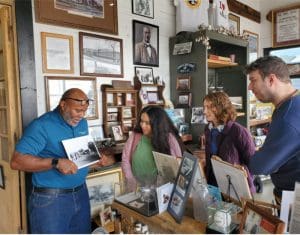
The Importance of Sharing Stories
In an effort to both share Huntsville’s history and fight against epistemicide, these iSchool scholars have drawn on their trip experiences to craft resources, plan exhibits, and publish peer-reviewed scholarships in partnership with Dr. Patin. In early 2024, Smith and Patin will publish “Giving Voice through Reparative Storytelling: Correcting Racist Epistemic Injustices in LIS” to appear in Library Quarterly, while Youngman and Patin will publish “Spreading Sankofa: Addressing Digital Epistemicide through LIS Education” to appear in the Journal of Digital Social Research. Most recently, Dr. Patin delivered an invited lecture for the University of Michigan School of Information Winter 2023 Seminar Series, entitled “From Erasure to Empowerment: The Role of Information in Fighting Epistemicide.”
Encountering the places so often talked about in stories from Huntsville’s civil rights era was a powerful experience for Dr. Melissa Smith.
“When we visited the site of the 5th Avenue School, even though there was just a placard marking the spot, I still felt like I was on sacred ground. That is the feeling I want to remember as I work on the many images we captured of the CSC’s and the Hereford’s work,” said Dr. Smith. “Dr. Hereford worked hard to make the importance of his historic actions part of Huntsville’s collective memory and to educate people about Civil Rights practically every day of his life.”
This trip was inspiring to Kianna Shakir, who expressed her gratitude to others engaging in this work.
“I just felt very grateful to have gotten the opportunity to play a small role in archiving the Hereford family story and to have been welcomed so kindly by everyone that has been doing the history-making and documentation work,” said Shakir. “Going to Huntsville for this research trip made me reflect on the librarian I want to be.”
Tyler Youngman felt this trip was more than scanning and surveying or digitizing and describing.
“It was about seeing and believing that social change is possible through the preservation, sharing, and reimagining of histories that communities, by banding together, have made a sustained effort to pass on,” said Youngman. “The community collections we explored were created in an active resistance to the all-too-often practices of leaving our history in the past.”
